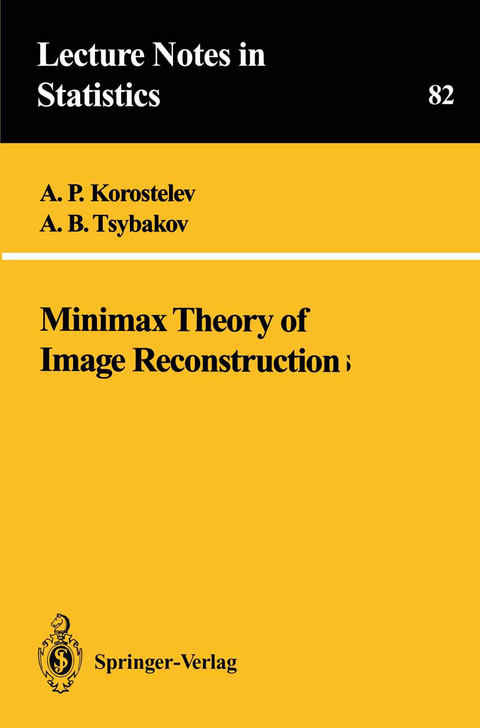
Minimax Theory of Image Reconstruction
Springer-Verlag New York Inc.
978-0-387-94028-1 (ISBN)
There exists a large variety of image reconstruction methods proposed by different authors (see e. g. Pratt (1978), Rosenfeld and Kak (1982), Marr (1982)). Selection of an appropriate method for a specific problem in image analysis has been always considered as an art. How to find the image reconstruction method which is optimal in some sense? In this book we give an answer to this question using the asymptotic minimax approach in the spirit of Ibragimov and Khasminskii (1980a,b, 1981, 1982), Bretagnolle and Huber (1979), Stone (1980, 1982). We assume that the image belongs to a certain functional class and we find the image estimators that achieve the best order of accuracy for the worst images in the class. This concept of optimality is rather rough since only the order of accuracy is optimized. However, it is useful for comparing various image reconstruction methods. For example, we show that some popular methods such as simple linewise processing and linear estimation are not optimal for images with sharp edges. Note that discontinuity of images is an important specific feature appearing in most practical situations where one has to distinguish between the "image domain" and the "background" . The approach of this book is based on generalization of nonparametric regression and nonparametric change-point techniques. We discuss these two basic problems in Chapter 1. Chapter 2 is devoted to minimax lower bounds for arbitrary estimators in general statistical models.
1. Nonparametric Regression and Change-Point Problems.- 1.1. Introduction.- 1.2. The nonparametric regression problem.- 1.3. Kernel estimators.- 1.4. Locally-polynomial estimators.- 1.5. Piecewise-polynomial estimators.- 1.6. Bias and variance of the estimators.- 1.7. Criteria for comparing the nonparametric estimators.- 1.8. Rates of the uniform and L1- convergence.- 1.9. The change-point problem.- 2. Minimax Lower Bounds.- 2.1. General statistical model and minimax rates of convergence.- 2.2. The basic idea.- 2.3. Distances between distributions.- 2.4. Examples.- 2.5. The main theorem on lower bounds.- 2.6. Assouad’s lemma.- 2.7. Examples: uniform and integral metrics.- 2.8. Arbitrary design.- 3. The Problem of Edge and Image Estimation.- 3.1. Introduction.- 3.2. Assumptions and notation.- 3.3. Lower bounds on the accuracy of estimates.- 4. Optimal Image and Edge Estimation for Boundary Fragments.- 4.1. Optimal edge estimation.- 4.2. Preliminary lemmas.- 4.3. Proof of Theorem 4.1.1.- 4.4. Optimal image estimation.- 4.5. Proof of Theorem 4.4.5.- 5. Generalizations and Extensions.- 5.1. High-dimensional boundary fragments. Non-Gaussian noise.- 5.2. General domains in high dimensions: a simple and rough estimator.- 5.3. Optimal estimators for general domains in two dimensions.- 5.4. Dudley’s classes of domains.- 5.5. Maximum likelihood estimation on ?-net.- 5.6. Optimal edge estimators for Dudley’s classes.- 5.7. On calculation of optimal edge estimators for general domains.- 6. Image Reconstruction Under Restrictions on Estimates.- 6.1. Naïve linewise processing.- 6.2. Modified linewise procedure.- 6.3. Proofs.- 6.4. Linear image estimators.- 7. Estimation of Support of a Density.- 7.1. Problem statement.- 7.2. A simple and rough support estimator.- 7.3. Minimaxlower bounds for support estimation.- 7.4. Optimal support estimation for boundary fragments.- 7.5. Optimal support estimation for convex domains and for Dudley’s classes.- 8. Estimation of The Domain’s Area.- 8.1. Preliminary discussion.- 8.2. Domain’s area estimation in continuous parametric models.- 8.3. Theorem on the lower bound.- 8.4. Optimal estimator for the domain’s area.- 8.5. Generalizations and extensions.- 8.6. Functionals of support of a density.- 9. Image Estimation from Indirect Observations.- 9.1. The blurred image model.- 9.2. High-dimensional blurred image models.- 9.3. Upper bounds in non-regular case.- 9.4. The stochastic problem of tomography.- 9.5. Minimax rates of convergence.- References.- Author Index.
| Reihe/Serie | Lecture Notes in Statistics ; 82 |
|---|---|
| Zusatzinfo | XII, 258 p. |
| Verlagsort | New York, NY |
| Sprache | englisch |
| Maße | 155 x 235 mm |
| Themenwelt | Informatik ► Grafik / Design ► Digitale Bildverarbeitung |
| Mathematik / Informatik ► Mathematik ► Wahrscheinlichkeit / Kombinatorik | |
| ISBN-10 | 0-387-94028-6 / 0387940286 |
| ISBN-13 | 978-0-387-94028-1 / 9780387940281 |
| Zustand | Neuware |
| Haben Sie eine Frage zum Produkt? |
aus dem Bereich


